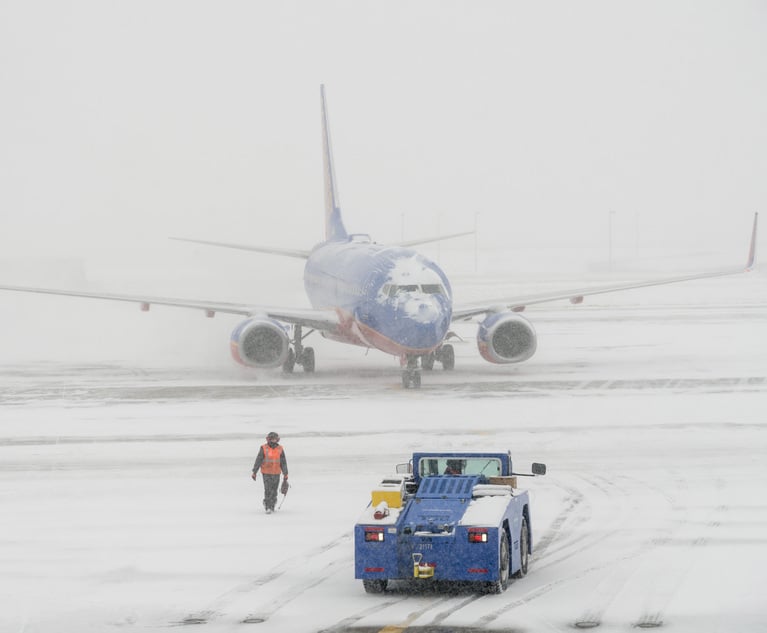 View of a yellow Airbus A320 airplane from low-cost carrier Spirit Airlines at Chicago O'Hare International Airport. Credit: EQRoy/Shutterstock
View of a yellow Airbus A320 airplane from low-cost carrier Spirit Airlines at Chicago O'Hare International Airport. Credit: EQRoy/Shutterstock Merger Vote at Spirit Could Reshape Discount Airline Market
Spirit is the largest budget airline in the United States, but its days as a stand-alone company appear numbered.
June 30, 2022 at 06:51 PM
6 minute read
The prospect of a takeover of Spirit Airlines threatens to upend the cheap-fare end of the industry much like a series of mergers among big airlines reduced choices for travelers.
Spirit is the largest budget airline in the United States, but its days as a stand-alone company appear numbered. The big question is whether it is sold to fellow discounter Frontier Airlines or to JetBlue, which operates more like the four giants that dominate the U.S. airline business.
Late Wednesday, Spirit delayed a shareholder vote on a merger with Frontier from Thursday until July 8. Spirit said it would use the extra time to continue talking with Frontier and JetBlue Airways about their rival bids for Spirit.
The outcome could determine how many choices travelers have for the lowest fares. That's particularly important to leisure customers, the group that Spirit targets.
Spirit shareholders are looking at a stock-and-cash offer from Frontier that is currently worth about $22 per share, or $2.4 billion, and would give Spirit shareholders 48.5% of the combined airline. Spirit's board has continued to support the deal in the face of a hostile bid from JetBlue worth $33.50 per share, or $3.6 billion.
JetBlue says its all-cash offer is financially superior. Frontier argues that its proposal will be better for Spirit shareholders in the long run, assuming that airline stocks recover to pre-pandemic levels.
Both covet Spirit because of its relatively young fleet of more than 170 planes and its roughly 3,000 pilots — even more valuable during a pilot shortage that could last most of this decade.
Antitrust regulators are sure to examine either deal closely. Frontier and JetBlue both claim that consumers will benefit if they win the Spirit sweepstakes. A Frontier-Spirit combination would operate about 5% of the nation's flights, and JetBlue plus Spirit would operate more than 7%, based on July schedules, making either one a stronger competitor to American, United, Delta and Southwest.
People who follow the industry closely are divided over which deal would help consumers more. Those who prefer a Frontier-Spirit deal point out that both are "ultra low-cost carriers" that charge rock-bottom fares — although they add many fees. They say JetBlue has become too much like the bigger airlines.
"You end up either with another big, high-cost, regular-fare airline (with JetBlue), or you end up with a truly nationwide ultra-low-cost-carrier that's twice the size of anything today," says Robert Mann, a longtime airline executive and consultant. Consumers, he said, "should be looking for continuation of a true low-fare, austere environment with the Spirit-Frontier combination."
Scott Keyes, the founder of Scott's Cheap Flights travel site, doesn't like either deal, "but I like the JetBlue option even less."
Keyes said removing a competitor always tends to push up fares, but the impact won't be as bad if the buyer is another budget airline like Frontier.
"Even if you never fly Spirit or Frontier, you still owe them a debt of gratitude for causing your Delta or American flight to be cheaper than it would be otherwise," he said.
Spooked by the growth of the discount airlines, bigger carriers started to sell "Basic Economy" fares in recent years, although they limit the number of bargain-bin seats on each flight.
JetBlue CEO Robin Hayes counters with a decade-old study by MIT researchers who found that JetBlue flying a particular route did more to reduce prices than did service by budget airlines, which account for a small portion of the market. He has taken to calling it "the JetBlue effect."
Michael Linenberg, an airline analyst for Deutsche Bank, said if JetBlue succeeds in buying Spirit, some of the cheapest fares might go away, but a bigger JetBlue could replace them with seats that appeal to other kinds of travelers. He pointed to JetBlue's "Mint" business-class service, which has been so successful on transcontinental flights that it forced bigger rivals to cut prices on their premium seats.
"It's not all about catering to people who want to pay $29 or $59 fares. There are passenger segments that JetBlue will serve that Frontier and Spirit do not," Linenberg said. "There are going to be lots of seats out there, and it's not like JetBlue will stop offering low fares."
Savanthi Syth, an airline analyst for Raymond James & Associates, said any loss of cheap seats after a JetBlue-Spirit deal will be temporary because other budget carriers — notably including Frontier — will grow.
"Frontier has the order book (for new planes) to step in and pick up what Spirit leaves behind," she said.
It's even harder to predict whether a Spirit sale will make much difference in customer service.
Spirit had the highest rate of consumer complaints to the government in the latest figures from the Transportation Department, covering April, and has finished at the bottom five of the last seven years.
Neither would-be buyer seems likely to improve Spirit's poor record. Frontier had the worst complaint rate the other two years, and JetBlue's rate last year was higher than everyone except Spirit and Frontier.
Several mergers between 2008 and 2013 — Delta bought Northwest, United absorbed Continental, Southwest bought rival low-cost carrier AirTran, and American and US Airways combined — left four airlines in control of 80% of the U.S. market and ushered in several years of airfares rising faster than inflation. The pace of consolidation then slowed, with only one major deal, Alaska Airlines' 2016 acquisition of Virgin America.
Airline industry officials believe that that antitrust regulators would prevent American, United, Delta or Southwest from snapping up any rivals, but that doesn't rule out further consolidation. Some analysts say a merger of JetBlue on the East Coast and Alaska in the West would make sense. Smaller players Allegiant Air, Sun Country and startups Avelo and Breeze could become takeover targets at some point.
"In the ultra-low-cost space, we probably have too many players. I think we will see consolidation," said Linenberg, the Deutsche Bank analyst. "Do we need eight or nine or 10 airlines flying from New York to Fort Lauderdale?"
David Koenig reports for the Associated Press.
NOT FOR REPRINT
© 2025 ALM Global, LLC, All Rights Reserved. Request academic re-use from www.copyright.com. All other uses, submit a request to [email protected]. For more information visit Asset & Logo Licensing.
You Might Like
View All
Aviation Attorney and Pilot Analyzes Jeju Air Crash, Potential Litigation Issues

Southwest Airlines Faces $100M Class Action Over Pay Periods


Securities Claims Against Lilium N.V. for Electric Plane Production Delays Fail to Take Flight, Federal Judge Holds
5 minute readTrending Stories
- 1Uber Files RICO Suit Against Plaintiff-Side Firms Alleging Fraudulent Injury Claims
- 2The Law Firm Disrupted: Scrutinizing the Elephant More Than the Mouse
- 3Inherent Diminished Value Damages Unavailable to 3rd-Party Claimants, Court Says
- 4Pa. Defense Firm Sued by Client Over Ex-Eagles Player's $43.5M Med Mal Win
- 5Losses Mount at Morris Manning, but Departing Ex-Chair Stays Bullish About His Old Firm's Future
Who Got The Work
J. Brugh Lower of Gibbons has entered an appearance for industrial equipment supplier Devco Corporation in a pending trademark infringement lawsuit. The suit, accusing the defendant of selling knock-off Graco products, was filed Dec. 18 in New Jersey District Court by Rivkin Radler on behalf of Graco Inc. and Graco Minnesota. The case, assigned to U.S. District Judge Zahid N. Quraishi, is 3:24-cv-11294, Graco Inc. et al v. Devco Corporation.
Who Got The Work
Rebecca Maller-Stein and Kent A. Yalowitz of Arnold & Porter Kaye Scholer have entered their appearances for Hanaco Venture Capital and its executives, Lior Prosor and David Frankel, in a pending securities lawsuit. The action, filed on Dec. 24 in New York Southern District Court by Zell, Aron & Co. on behalf of Goldeneye Advisors, accuses the defendants of negligently and fraudulently managing the plaintiff's $1 million investment. The case, assigned to U.S. District Judge Vernon S. Broderick, is 1:24-cv-09918, Goldeneye Advisors, LLC v. Hanaco Venture Capital, Ltd. et al.
Who Got The Work
Attorneys from A&O Shearman has stepped in as defense counsel for Toronto-Dominion Bank and other defendants in a pending securities class action. The suit, filed Dec. 11 in New York Southern District Court by Bleichmar Fonti & Auld, accuses the defendants of concealing the bank's 'pervasive' deficiencies in regards to its compliance with the Bank Secrecy Act and the quality of its anti-money laundering controls. The case, assigned to U.S. District Judge Arun Subramanian, is 1:24-cv-09445, Gonzalez v. The Toronto-Dominion Bank et al.
Who Got The Work
Crown Castle International, a Pennsylvania company providing shared communications infrastructure, has turned to Luke D. Wolf of Gordon Rees Scully Mansukhani to fend off a pending breach-of-contract lawsuit. The court action, filed Nov. 25 in Michigan Eastern District Court by Hooper Hathaway PC on behalf of The Town Residences LLC, accuses Crown Castle of failing to transfer approximately $30,000 in utility payments from T-Mobile in breach of a roof-top lease and assignment agreement. The case, assigned to U.S. District Judge Susan K. Declercq, is 2:24-cv-13131, The Town Residences LLC v. T-Mobile US, Inc. et al.
Who Got The Work
Wilfred P. Coronato and Daniel M. Schwartz of McCarter & English have stepped in as defense counsel to Electrolux Home Products Inc. in a pending product liability lawsuit. The court action, filed Nov. 26 in New York Eastern District Court by Poulos Lopiccolo PC and Nagel Rice LLP on behalf of David Stern, alleges that the defendant's refrigerators’ drawers and shelving repeatedly break and fall apart within months after purchase. The case, assigned to U.S. District Judge Joan M. Azrack, is 2:24-cv-08204, Stern v. Electrolux Home Products, Inc.
Featured Firms
Law Offices of Gary Martin Hays & Associates, P.C.
(470) 294-1674
Law Offices of Mark E. Salomone
(857) 444-6468
Smith & Hassler
(713) 739-1250






